“This is a tremendous experience. Working in St. Petersburg is “a colossal experience”! Tremendous experience
How did you start your career in the company?
I came to MEGAPOLIS in 2003 as a credit controller, and before that I worked as a customer service manager at financial organization. What attracted me to the company was that it was a large distributor with a good reputation and opportunities for professional and career growth. The credit department at MEGAPOLIS was just being created at that time, and I had a lot to learn. And so it happened: after a year and a half I became a senior credit controller, and five years later - deputy head of the department. In my opinion, management appreciated my initiative, generation of ideas and their implementation, as well as my willingness to replace colleagues in my work if such a need arose.
What achievements are you proud of?
During my work as head of the treasury credit department, the amount of overdue debt from clients to the company decreased significantly, which made it possible to improve accounts receivable turnover rates and reduce the amount of working capital involved. Together with the sales department, we automated work with key counterparties, analyzed the quality of payment discipline, finalized and automated systems for assessing solvency and verifying counterparties.
How did the company evaluate your achievements?
I was awarded a gold badge “For contribution to the development of the company.” At that time, only 20 company managers with a staff of 14.5 thousand employees received this award. It was a great honor for me to be included valuable employees"MEGAPOLIS".

Among the owners of MEGAPOLIS there are foreign shareholders. How does their presence affect corporate culture and the company's operating style?
We are a transparent company, and this guarantees paid vacations and white wages. We also receive subsidies for food in the corporate canteen and medical insurance. Every year we conduct staff assessments. It allows managers to constantly improve their skills, gain additional education and predict an increase wages upon achieving a certain result. The Corporate University created in the company also helps in this, which allows for targeted improvement of employee qualifications, which ultimately has a positive effect on the company’s performance. There are more and more opportunities for professional and personal growth here every year. Thus, this year employees have the opportunity to evaluate department heads using the “360 degree” method. Thanks to feedback with our subordinates we see our strengths and weak sides and we also get an incentive to develop further.
Many top managers face overtime. Is this problem relevant to you?
I usually stay in the office only when large projects are due, and I cope with current work in the allotted time. However, periodic rework is not scary for me: thanks to new projects and complex tasks I'm growing professionally. For example, in 2015 we opened a United Customer Service Center in Samara. I was directly involved in this process and am very pleased with how great it all turned out.
How do new IT technologies affect the work of your department?
Gradually, computers are starting to do all the routine work: defaulters are automatically charged penalties - previously we did this manually. Now every client receives on our website Personal Area, where he can see if he has a debt.
MEGAPOLIS has a large staff of employees, many regional branches all around Russia. How do you communicate with each other?
We communicate by e-mail. Once a quarter a corporate magazine is published, which describes the work of different departments. There is a section for new employees on our internal portal. It describes the company structure, instructions, and responsibilities of managers. If something is unclear to a newcomer, he can ask the administrator questions through a special “Question - Answer” form.

Is it easy to be the director of St. Petersburg, and even for more than one year? The answer to this question became clear during an interview with Kalinina Svetlana- a successful lawyer today and a former law student.
Kalinina Svetlana Alexandrovna – HSE graduate in 2013, who for two years academic years led the Student Legal Bureau. Svetlana began her activities in St. Petersburg as an intern while in her second year and until graduation she worked for the benefit of the student organization and, of course, for the benefit of the population of Nizhny Novgorod, who are in need of free legal assistance.
To this day, Svetlana remains not indifferent to the fate of the legal clinic and its employees - last year, under her leadership, student interns and consultants of St. Petersburg were able to try themselves as representatives of the parties in the arbitration process! The business game was characterized by maximum realism, which resulted in St. Petersburg employees receiving valuable practical skills.
Interviewer: What is your current place of work, position?
Svetlana: Lawyer at the INTELLECT-S group of legal companies.
AND: What course did you take to St. Petersburg?
WITH: At the end of the second year I started working in St. Petersburg as an intern.
I: In which St. Petersburg Centers did you have the opportunity to work?
From: Moscow and Sormovo centers.
I: How did you get to St. Petersburg? Was this a “conscious” choice?
WITH: At first I was interested in “what are senior students doing here?”, and I consciously asked. Then I realized that it was very interesting and also consciously continued to work.
AND: What did working in St. Petersburg give you?
S: The list here can be huge! This is a tremendous experience! Experience in communicating with the public, ability to behave in conflict situations, independently solve various problems, quickly navigate what is happening. Experience in communicating with municipal authorities and officials. There is enough experience in public speaking (from the director of St. Petersburg), which is especially valuable! Experience communicating with peer students who need to be motivated and helped in solving problems. And a lot of everything besides that.
I: As an employee of St. Petersburg, were you in any way different from other students?
WITH: I was the director after all. If we talk about my character, it seems to me that I could never “score” and relax. If there were current problems in St. Petersburg, dissatisfaction on the part of the guys or clients, I considered these personal problems. But at the same time, St. Petersburg also taught me a calmer attitude towards difficult situations, that is, a lack of panic and concentration on solving the difficulties that arose.
I: Do you remember your first client or the first case you resolved?
WITH: I don’t remember, because the first case was so difficult for me that I simply did not understand the essence of the question (laughs).
The older guys later talked to that client, because I was only in my 2nd year. I remember well the client with whom I went to court. We lost. As I understand now (I remember the essence of the case very well), it was a very complex and confusing matter, ambiguous. The client itself was also not the easiest, to be honest (smiles). She then called me with or without reason, asking any questions more or less related to the law at any time of the day or night... Since then, I rarely give my number to clients (smiles).
I: Did working in St. Petersburg help in your future professional activities?
S: Absolutely. Not so much knowledge, but skills in handling knowledge and communication skills. Frankly speaking, it’s difficult to actually learn something legally in St. Petersburg... Not all consultations are highly literate. But! St. Petersburg provides practice that is very useful in another sense!
I: What would you like to wish to current clinicians?
S: Passion for the business!
I: Thank you very much for participating in the survey!
Viktor Viktorovich Korochkin, chief manager of the Russian Rugby Federation for the development of youth rugby, spoke about the development of the sport in our country, the problems that have to be faced, and what the Spartakiad gives to the participants.
– What is your direct role here at the Spartakiad?
– I represent the Rugby Federation as an official, including the Federal Sports Reserve Training Center here. This is the organizing organization for this Spartakiad. So I make sure that the competition is conducted correctly. You could say I am in the role of a commissioner.
– You were here last year at the Universiade. Has anything changed in a year?
– Yes, I was in the same role. I can say that it has become hotter (laughs). But seriously, everything was fine last year too. The level of conduct was quite high. And everything remained at a good level; nothing changed for the worse.
– Surely this was one of the factors when choosing the venue for the Spartakiad? - Yes, definitely. We had several candidates, but they refused. Therefore, the choice fell on Belgorod, which successfully held the Universiade. There are, of course, some things that need to be worked on, but I think we will improve them if we continue to work in the future. The main thing we need for big rugby is a second field. This is necessary primarily in order not to “kill” one field. 29 games on one field is a lot, and if it rains... And rugby players all love natural fields. I think that here in Belgorod there are prospects.
– If we return to the conversation about youth rugby, how would you assess the level of its development in the country? this moment?
– Every year there is development. Maybe not as quickly as we would like. This, of course, is not least related to the questions economic development. We have a lot of teams for children, up to 14 years old. With older children, work begins in children's sports schools, of which there are not enough rugby schools in our country. Not all teams have the opportunity to travel to competitions. This is very bad because children need to compete. They are not interested in training, but they need to compete.
On the other hand, we have new regions, new federations are opening. I hope this event will give impetus to the opening of a children’s and youth sports school here in Belgorod. The federation here is very good, the guys are proactive, eager to work and develop.
We have a global task - to densify the Central federal district, create other rugby centers in the regions around Moscow so that there is transport accessibility - take a bus and come to competitions in Tambov, Voronezh, Ryazan, Belgorod, etc. Our country is big - you can’t fly into Krasnoyarsk.
– What problems does the development of rugby in the regions face?
– Of course, financial problems play an important role. But there are others. For example, they haven’t opened a rugby department for a long, long time. Nizhny Novgorod. This sport has existed there for many years, there is a good team. But at the sports school they don’t give a single bet on rugby, although there are 32 bets on football. And this is the story in almost all regions.
Another problem is the availability of sites. There are no fields - either they were “rolled” in synthetics at one time, or residential complexes were built in their place.
There is also a problem with coaching staff. First of all, it is related to the level of salaries. At the initial level, when a coach just comes to a children's sports school, his salary is 6 thousand rubles. It is very difficult to live on this money. Of course, when years pass and the coach has good results, good children, then the salary becomes good. But we have to get to this point, not everyone can stand it, not all coaches are ready to endure it.
– Which regions can be named among the leading ones in rugby?
– Traditionally, this is the Krasnoyarsk region. There are two superclubs there, a well-functioning training system, many coaches, many children's schools. The Rostov region and the Krasnodar region are developing very well now. Among the so-called children's regions, the Kaliningrad region is actively developing. There are still many new regions for rugby where they want and can develop this sport.
– How easy or difficult is it now to attract children to classes?
– It’s actually very easy. Children are doing well, especially in small cities. In Moscow, let’s say, this is a problem, and for all sports there is a very wide variety of different offers, satiety. And in the regions, children are doing well.
In addition, we have a general education program designed specifically for school lessons. There is an international program “Get into rugby” - “Take up rugby”, this is an entry-level program, very interesting for children, there is no direct contact, children just play ball. Among other things, this is also a large Internet resource on which absolutely all the information is posted for physical education teachers and novice coaches, from what you should have in the lesson to various exercises with which even a novice teacher can organize training.
For the second year in a row we will participate in the Presidential Sports Games. These are the largest competitions among schoolchildren who study not in sports schools, but in general education schools. Among other sports, rugby is represented in the final.
– For example, at the last Universiade, teams from 63 universities took part in the qualifying competitions. Student sports are developing very strongly, and they are fueled by children from schools and sections. Growing up, they continue to play for student teams. Plus we have a very large amateur league. This is a very big positive point.
– In your opinion, what does the Spartakiad give to its participants? What will they return home with?
– This is, first of all, a colossal experience. Children's and youth sports schools are very interested in participating in such competitions, as this is the result of their work. Therefore, the inclusion of our sport in the program of various youth and youth competitions contributed to a significant increase in the work of sports schools.
Another important positive point is the atmosphere of the competition. Most of our children are non-conflict, they are friends with each other, communicate, despite what is happening on the field. Note that rugby is played first and then hands are shaken. The main principles of rugby are friendship, solidarity and respect. Rugby has a very big educational moment. 
– What can you say about the results and teams in the girls’ tournament?
– There are a lot of unexpected results. The level of the teams has grown a lot compared to the last Spartakiad, just a cut above. It turned out that they do not have clear favorites.
But the tournament promises to be very interesting for the boys as well. Krasnoyarsk, as a rule, is always well prepared. But all the teams behind him are very good and interesting. First of all, these are teams from the Moscow region and Krasnodar region. We don’t know what to expect from Rostov. At the Russian Championship I really liked the St. Petersburg team. Kaliningrad can also “catch” someone. So it will be very interesting for the boys too.
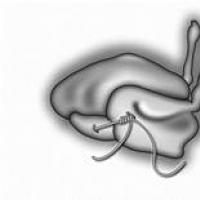 Types of poultry dressing. Profession: cook. Tutorial: Putting poultry into a pocket
Types of poultry dressing. Profession: cook. Tutorial: Putting poultry into a pocket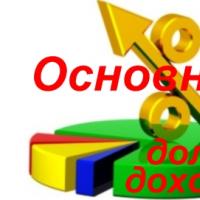 The main activity according to OKVED What type of activity to choose for individual entrepreneurs
The main activity according to OKVED What type of activity to choose for individual entrepreneurs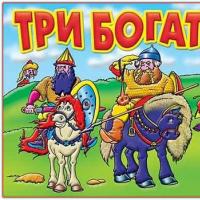 Development script on a military-patriotic theme Production on a military theme script
Development script on a military-patriotic theme Production on a military theme script What does the name Victor mean for a boy?
What does the name Victor mean for a boy? Corella parrot school - learning to speak, sing and dance
Corella parrot school - learning to speak, sing and dance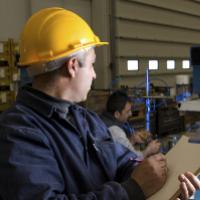 Rules for filling out the safety log
Rules for filling out the safety log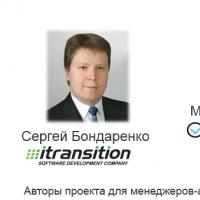 Business Analyst - IT1410: Software Requirements Development - Business Informatics
Business Analyst - IT1410: Software Requirements Development - Business Informatics